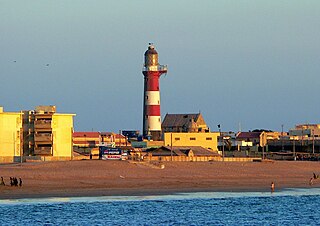This article needs additional citations for verification .(November 2024) |
Khiprianwala Island is a small island located in the Arabian Sea off the coast of Karachi, Sindh, Pakistan. [1]
This article needs additional citations for verification .(November 2024) |
Khiprianwala Island is a small island located in the Arabian Sea off the coast of Karachi, Sindh, Pakistan. [1]

The Arabian Sea is a region of sea in the northern Indian Ocean, bounded on the west by the Arabian Peninsula, Gulf of Aden and Guardafui Channel, on the northwest by Gulf of Oman and Iran, on the north by Pakistan, on the east by India, and on the southeast by the Laccadive Sea and the Maldives, on the southwest by Somalia. Its total area is 3,862,000 km2 (1,491,000 sq mi) and its maximum depth is 5,395 meters. The Gulf of Aden in the west connects the Arabian Sea to the Red Sea through the strait of Bab-el-Mandeb, and the Gulf of Oman is in the northwest, connecting it to the Persian Gulf.

Pakistan, officially the Islamic Republic of Pakistan, is a country in South Asia. It is the fifth-most populous country, with a population of over 241.5 million, having the second-largest Muslim population as of 2023. Islamabad is the nation's capital, while Karachi is its largest city and financial centre. Pakistan is the 33rd-largest country by area. Bounded by the Arabian Sea on the south, the Gulf of Oman on the southwest, and the Sir Creek on the southeast, it shares land borders with India to the east; Afghanistan to the west; Iran to the southwest; and China to the northeast. It shares a maritime border with Oman in the Gulf of Oman, and is separated from Tajikistan in the northwest by Afghanistan's narrow Wakhan Corridor.
The Leader of the Opposition is a title traditionally held by the leader of the largest political party not in government, typical in countries utilizing the parliamentary system form of government. The leader of the opposition is typically seen as an alternative prime minister, premier, first minister, or chief minister to the incumbent; in the Westminster system, they head a rival alternative government known as the shadow cabinet or opposition front bench. The same term is also used to refer to the leader of the largest political party that is not in government in subnational state, provincial, and other regional and local legislatures.

The 1970 Bhola cyclone was a devastating tropical cyclone that struck East Pakistan and India's West Bengal on 12 November 1970. It remains the deadliest tropical cyclone ever recorded and one of the world's deadliest humanitarian disasters. At least 300,000 people died in the storm, possibly as many as 500,000, primarily as a result of the storm surge that flooded much of the low-lying islands of the Ganges Delta. Bhola was the sixth and strongest cyclonic storm of the 1970 North Indian Ocean cyclone season.

UTC+05:00 is an identifier for a time offset from UTC of +05:00. This time is used in:
Baba and Bhit Islands are two small and densely populated islands located in the Karachi Harbour, in Karachi, Pakistan. The approximate area of Bhit island is roughly 0.16 km2 while that of Baba island is around 0.15 km2. Around 5,400 people live on Bhit island while around 6,600 people live on Baba island. With a population density of 33,750 and 44,000 people per km2 respectively, resulting in both islands being among the most densely populated islands in the world.

Astola Island also known as Jezira Haft Talar, Satadip, 'Island of the Seven Hills' or Dajjal Island is a small uninhabited Pakistani island in the Arabian Sea approximately 25 km (16 mi) south of the nearest part of the coast and 39 km (24 mi) southeast of the fishing port of Pasni.
Ethnic groups in South Asia are ethnolinguistic groupings within the diverse populations of South Asia, including the countries of Bangladesh, Bhutan, India, Maldives, Nepal, Pakistan, and Sri Lanka. Afghanistan is variously considered to be a part of both Central Asia and South Asia, which means Afghans are not always included among South Asians, but when they are, South Asia has a total population of about 2.04 billion.
Bundal Island is a small island located in the Arabian Sea off the coast of Karachi, Sindh. It is an inhabited island on which an old Sufi Saint, Yousuf Shah's shrine is also present.

Sadh Belo, also spelt as Sadh Bela, or Sat, is an island in the Indus River near Sukkur, Sindh, Pakistan that is famous for its highly revered Udasi Sikhs temples. The temples are associated with the syncretic Udasi movement of Sikhism. The island is famous for Teerath Asthan which is the biggest Hindu temple in Pakistan. The complex has eight other temples, a library, dining areas, a huge garden, along with rooms and residences for monks and people who want to stay on the island on a spiritual retreat.

The Manora Cantonment is a cantonment town in a small Manora Island, located just south of Karachi, in Sindh, Pakistan. It serves as a military base and residential establishment. Established by the British Indian Army in 19th-century British India, the cantonment was taken over by the Pakistan Army upon the country's independence in 1947.
Shamspir is an island village near Karachi, Pakistan, along the western end of Karachi Harbour, close to Sandspit Beach and Kakapir. It is administered as part of the Keamari District. Approximately 5,000 people now live on the island. The village is bordered by thick Mangrove forests which grow in the harbour.

The Indian subcontinent is a physiographical region in Southern Asia, mostly situated on the Indian Plate, projecting southwards into the Indian Ocean from the Himalayas. Geographically, it spans the countries of Bangladesh, Bhutan, the British Indian Ocean Territory, India, Maldives, Nepal, Pakistan, and Sri Lanka. Although the terms "Indian subcontinent" and "South Asia" are often used interchangeably to denote the region, the geopolitical term of South Asia frequently includes Afghanistan, which is not considered a part of the subcontinent, while excluding the British Indian Ocean Territory which is geologically associated with the subcontinent.
The 2009 Lahore bombing, at police headquarters in Lahore, Pakistan on 27 May 2009, killed at least 35 people and injured 250. During the attack gunmen fired on guards then destroyed the emergency response building at the city's police headquarters. Offices used by the Inter-Services Intelligence (ISI) agency nearby also suffered damage.

Manora is a small peninsula that forms a protective barrier between Karachi Harbour to the north and the Arabian Sea to the south. Manora, having a total population of 4,273 local residents, was formerly an island, but due to silting is now connected to the mainland by a 12 kilometer long natural sandbridge known as Sandspit. The entrance to Karachi was once guarded against pirate raids by the Manora Fort built in the 1790s, which was later upgraded by the British, and then the Pakistan Navy.

The small Indian mongoose is a mongoose species native to Iraq and northern India; it has also been introduced to several Caribbean and Pacific islands.

YouTube Kids is an American video app and website for children developed by YouTube, a subsidiary of Google. The app provides a version of the service oriented solely towards children, with curated selections of content, parental control features, and filtering of videos deemed inappropriate for viewing by children under the age of 13, in accordance with the Children's Online Privacy Protection Act, which prohibits the regular YouTube app from advertising to children under the age of 13.